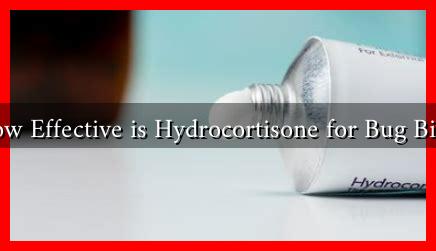-
Table of Contents
How Effective is Hydrocortisone for Bug Bites?
Bug bites can be a nuisance, causing discomfort, itching, and sometimes even allergic reactions. Among the various treatments available, hydrocortisone cream is a popular choice for alleviating the symptoms associated with insect bites. This article explores the effectiveness of hydrocortisone for bug bites, its mechanism of action, and considerations for its use.
Understanding Hydrocortisone
Hydrocortisone is a synthetic corticosteroid that mimics the effects of cortisol, a hormone produced by the adrenal glands. It is commonly used in topical formulations to reduce inflammation, redness, and itching. Hydrocortisone is available over-the-counter in various strengths, typically ranging from 0.5% to 2.5%.
How Hydrocortisone Works
The effectiveness of hydrocortisone in treating bug bites can be attributed to its anti-inflammatory properties. When applied to the skin, hydrocortisone works by:
- Inhibiting the release of inflammatory substances, such as histamines and prostaglandins.
- Reducing swelling and redness in the affected area.
- Alleviating itching by calming the nerve endings in the skin.
These actions make hydrocortisone particularly effective for treating reactions to insect bites, such as those from mosquitoes, bees, and wasps.
Effectiveness of Hydrocortisone for Bug Bites
Numerous studies and anecdotal evidence support the use of hydrocortisone for managing the symptoms of bug bites. For instance, a study published in the Journal of Dermatological Treatment found that topical corticosteroids, including hydrocortisone, significantly reduced itching and inflammation in patients with insect bite reactions.
In practical terms, hydrocortisone can be effective in the following scenarios:
- Minor Reactions: For mild reactions, such as those caused by mosquito bites, hydrocortisone can provide quick relief from itching and swelling.
- Moderate Reactions: In cases of moderate swelling or redness, hydrocortisone can help reduce symptoms effectively.
- Allergic Reactions: For individuals with allergic reactions to insect bites, hydrocortisone can be part of a broader treatment plan, although severe reactions may require additional medical intervention.
Considerations and Limitations
While hydrocortisone is generally safe for short-term use, there are some considerations to keep in mind:
- Duration of Use: Prolonged use of hydrocortisone can lead to skin thinning and other side effects. It is recommended to use it for no longer than one week without consulting a healthcare provider.
- Not for Severe Reactions: Hydrocortisone is not suitable for severe allergic reactions, such as anaphylaxis, which require immediate medical attention.
- Skin Conditions: Individuals with certain skin conditions, such as rosacea or acne, should consult a healthcare professional before using hydrocortisone.
Alternative Treatments
In addition to hydrocortisone, there are other treatments available for bug bites:
- Antihistamines: Oral antihistamines can help alleviate itching and swelling.
- Cold Compresses: Applying a cold compress can reduce swelling and numb the area.
- Calamine Lotion: This can soothe itching and provide a cooling effect.
Conclusion
Hydrocortisone is an effective treatment for managing the symptoms of bug bites, particularly for mild to moderate reactions. Its anti-inflammatory properties can provide quick relief from itching and swelling, making it a go-to option for many individuals. However, it is essential to use hydrocortisone responsibly and be aware of its limitations. For severe allergic reactions or prolonged symptoms, seeking medical advice is crucial. By understanding the effectiveness of hydrocortisone and considering alternative treatments, individuals can better manage the discomfort associated with bug bites.


